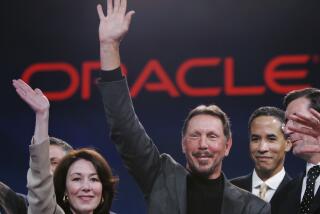Hewlett-Packard sues to keep former CEO from going to Oracle
- Share via
Intensifying an increasingly bitter feud between two technology heavyweights, Hewlett-Packard Co. went to court Tuesday to try to prevent its former chief executive, Mark V. Hurd, from taking a top post with Silicon Valley rival Oracle Corp.
A day after Oracle announced that Hurd would become the software giant’s co-president and have a seat on its board, HP filed a lawsuit alleging that Hurd could share company secrets with Oracle and asking that he be barred from working there.
Hurd, 53, abruptly resigned as head of HP last month after a former contract worker for the firm accused him of sexual harassment. HP said its probe of the allegation discovered no evidence of harassment but found “numerous instances” in which Hurd submitted inaccurate expense reports meant to conceal his relationship with the worker.
As the scandal unfolded, Oracle’s chairman and chief executive, Larry Ellison, emerged as one of Hurd’s key defenders and called Hurd’s ouster “the worst personnel decision since the idiots on the Apple board fired Steve Jobs.”
In a news release Monday announcing Hurd’s hiring, Ellison took another jab at the world’s largest computer maker, saying, “Mark did a brilliant job at HP and I expect he’ll do even better at Oracle.”
HP alleges in its lawsuit that, in order to fulfill those duties, Hurd “cannot help but utilize and disclose HP’s trade secrets and confidential information.” That situation, it said, would put HP’s secrets “in jeopardy.”
The lawsuit, filed with the California Superior Court for Santa Clara County, seeks an injunction preventing Hurd from working at Oracle. HP pointed to agreements that it said Hurd signed pledging not to engage in “conflicting business activities” for 12 months after he stopped working at HP.
Oracle and HP are among the world’s largest and most valuable technology companies. Both supply businesses with large computer systems that integrate software and hardware components.
Even if Hurd signed agreements prohibiting him from sharing trade secrets with competitors, the law may still give him substantial latitude, according to Matthew T. Bodie, a professor at Saint Louis University School of Law who studies corporate and employment issues.
“It’s not an open-and-shut case,” Bodie said. For one thing, California law does not generally recognize so-called noncompete agreements, in which departing employees pledge not to work for rival companies.
And if HP wants a court to prevent Hurd from working at Oracle, Bodie says, its lawyers will have to prove not only that Hurd had confidential information he could give to Oracle, but also that “there’s no way he can do his job without sharing it.”
Meanwhile, Bodie said, Hurd may argue that his hiring had nothing to do with HP’s trade secrets, and that Oracle “was just interested in [his] intellectual talent and experience.”
Ellison called the lawsuit “vindictive” and said it could undermine business dealings between the two companies.
“Oracle has long viewed HP as an important partner,” Ellison said in a statement. “By filing this vindictive lawsuit against Oracle and Mark Hurd, the HP board is acting with utter disregard for that partnership, our joint customers, and their own shareholders and employees. The HP board is making it virtually impossible for Oracle and HP to continue to cooperate and work together in the IT marketplace.”
As part of the lawsuit, HP asked the court to appoint a special master to regularly check on Hurd to make sure he wasn’t disclosing confidential information as part of his duties at Oracle.
But given the size of the companies involved, and the potential for leaks on many levels, Bodie said, “it would be difficult to figure out for sure whether the person actually used the trade secrets or not.”
Either way, Oracle’s stock rose on the news of Hurd’s new job, climbing $1.34, or 5.87%, to $24.26 during regular trading Tuesday. HP shares dropped 17 cents to $39.92.
david.sarno@latimes.com






